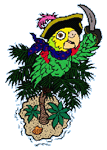 |

|
||||||||||
 |
 |
 |
 |
 |
 |
|
 |
||||
|
True Myths and False Truths by Scott Stork
''Poinsettias Aren't Poisonous But Neither Are Artichokes''POINSETTIAS - You have probably been hearing your entire life that Poinsettias are toxic and will kill any dog, bird or child who eats them. As it turns out they are harmless. I have heard from at least three separate sources that they are safe for birds and everyone else. I have tried to find out why we have been told they were toxic for so long. So far I have had no luck in finding this out. Because of my inability to answer this question I have decided to leave Poinsettias off of the safe house plant list, just in case. And I still wouldn't recommend giving one to your bird as a cage decoration. If, however, someone gives my wife and I one as a gift this year, I will be able to say thank you and mean it, instead of saying thank you and then chucking it in the garbage can as soon as they leave. If your bird eats any part of a Poinsettia or any other plant that is considered to be safe. You should still keep an eye on him or her. Watch for nausea, diarrhea, and loss of appetite, and any other sign of ill health or any unusual behaviors. Though you don't need to rush him or her off to the vet you should still play it safe and stay alert. . ARTICHOKES - Since I first started researching safe and toxic plants and foods I have come across many almost cryptic warnings about certain foods being deadly to pet birds. Eggplant, Artichokes, Beans, Rhubarb, Avocado etc. For some of these I have found legitimate sources that agree. For some I have found legitimate sources that disagree. For some I have found both, and for some I have found neither. First let me say that it is absolutely safe to feed your bird beans. As far as I can tell, this rumor started when someone took two facts and placed them together with no logic in-between. It is a fact that birds cannot easily pass air, or other gasses, out of their digestive system. It is also a fact that beans can cause a large amount of gas to build up in human digestive systems. However birds' digestive systems are very different from ours and what does or doesn't give them gas is also different. Rhubarb and Avocado are two food items that contain substances that might be toxic to birds. Typically the levels of these toxins are so low that the foods are not dangerous to birds. Things like being overripe or under cooked may effect the safety of these foods. Because I have seen enough legitimate information stating the possibility of danger inherent in feeding these foods to your bird we recommend against using them. Eggplant is probably perfectly safe but again questions remain. I have read: That there is a substance that could be toxic to birds found in the growing leaves. That this same toxin is in the skin of the plant. That the toxin is found throughout the plant when over ripe. And that the toxin may be in the seeds of a ripe plant. I have never read what exactly this toxin is or what levels are dangerous to birds. And I have read, written by different reliable sources that the plant is perfectly safe for birds. Because of the confusion we recommend being cautious when feeding your bird eggplant. Keep the amounts low and do not feed when over ripe and there should be nothing to worry about. There are many other vegetables and foods that have properties you should be aware of. We print a list of these with brief descriptions of what you should know about them. Artichokes do not appear on this list. Though, I (and possibly many of you) have heard that they are poisonous, I cannot find one official source that agrees. So though I don't give them to my birds (mainly because I don't like them, so I don't eat them) I have no reason to warn you against feeding your bird artichokes other than it just might turn out to be another "true myth" or is it a "false truth"?? The point to all of this is to be careful. Be careful of what you allow your bird to eat but also of what you base your opinions on. I have always been responsible for keeping track of safe and dangerous plants and foods. I have tried to be thorough and to err on the side of caution. The lists mentioned above are updated continuously and are available to all of our customers. If you have information to share let us know. I try to find at least one reliable source before I list anything as toxic and at least two reliable sources before I list it as safe Additional Safety articles:
|
Copyright
© 2000-2003 Parrot Island, Inc.
Send mail to webmaster with
questions or comments about this web site.